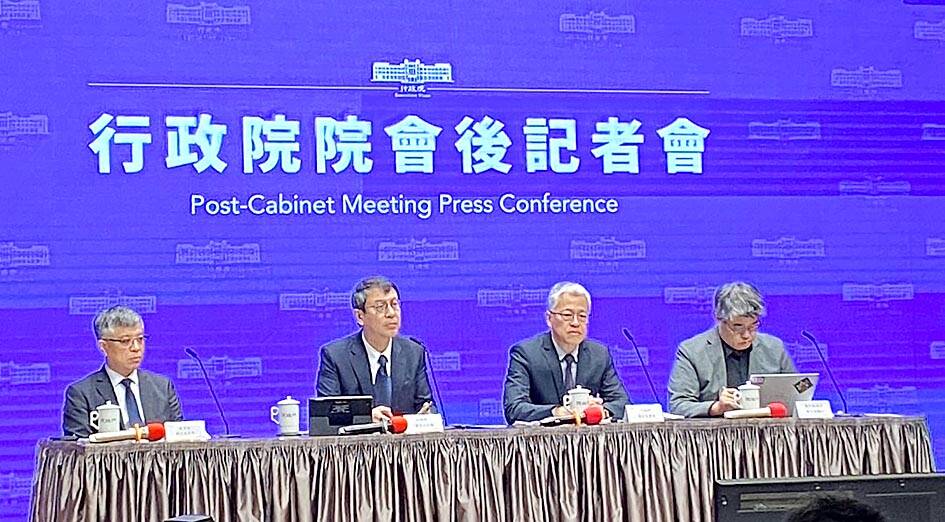The Cabinet yesterday approved draft amendments to the Nationality Act (國籍法) to ease residency requirements for some foreign professionals applying for naturalization and to allow social welfare agencies to apply for naturalization on behalf of stateless children who are residents.
The proposed amendments were approved by the Cabinet in September last year, but had to be reapproved and resubmitted because of the new legislative term that began on Feb. 1.
The Ministry of the Interior said that the draft amendments would help improve the retention of professional talent by cutting the required period of residency for “foreign high-level professionals” (外國高級專業人才) applying for citizenship from three continuous years, defined as being in the country for at least 183 days each year.

Photo: Chung Li-hua, Taipei Times
The required period of residency would be shortened to two continuous years, or a legal stay of more than five consecutive years for those who do not meet the 183 days per year requirement, the ministry said.
It has previously said that the changes would aid Taiwan’s efforts to recruit and naturalize foreign basketball players to play for the national team, a change that the national basketball association has sought.
To better protect children’s rights, the draft amendments include a new provision that allows social welfare authorities or institutions that act as guardians of stateless children to apply for Republic of China (ROC) nationality on their behalf, the ministry said.
Under the existing law, only adoptive parents of stateless people who are unmarried minors can apply for naturalization on their behalf, if at least one of the parents is an ROC citizen, the ministry said.
In addition, as Taiwan has amended its Civil Code to lower the legal age of majority from 20 to 18, the draft also changes the wording “unmarried minors” in the Nationality Act to “unmarried and under the age of 18.”

Intelligence agents have recorded 510,000 instances of “controversial information” being spread online by the Chinese Communist Party (CCP) so far this year, the National Security Bureau (NSB) said in a report yesterday, as it warned of artificial intelligence (AI) being employed to generate destabilizing misinformation. The bureau submitted a written report to the Legislative Yuan in preparation for National Security Bureau Director-General Tsai Ming-yen’s (蔡明彥) appearance before the Foreign Affairs and National Defense Committee today. The CCP has been using cognitive warfare to divide Taiwanese society by commenting on controversial issues such as Taiwan Semiconductor Manufacturing Co’s (TSMC, 台積電) investments in the

INVESTIGATION: The case is the latest instance of a DPP figure being implicated in an espionage network accused of allegedly leaking information to Chinese intelligence Democratic Progressive Party (DPP) member Ho Jen-chieh (何仁傑) was detained and held incommunicado yesterday on suspicion of spying for China during his tenure as assistant to then-minister of foreign affairs Joseph Wu (吳釗燮). The Taipei District Prosecutors’ Office said Ho was implicated during its investigation into alleged spying activities by former Presidential Office consultant Wu Shang-yu (吳尚雨). Prosecutors said there is reason to believe Ho breached the National Security Act (國家安全法) by leaking classified Ministry of Foreign Affairs information to Chinese intelligence. Following interrogation, prosecutors petitioned the Taipei District Court to detain Ho, citing concerns over potential collusion or tampering of evidence. The

‘COMPREHENSIVE PLAN’: Lin Chia-lung said that the government was ready to talk about a variety of issues, including investment in and purchases from the US The National Stabilization Fund (NSF) yesterday announced that it would step in to staunch stock market losses for the ninth time in the nation’s history. An NSF board meeting, originally scheduled for Monday next week, was moved to yesterday after stocks plummeted in the wake of US President Donald Trump’s announcement of 32 percent tariffs on Taiwan on Wednesday last week. Board members voted to support the stock market with the NT$500 billion (US$15.15 billion) fund, with injections of funds to begin as soon as today. The NSF in 2000 injected NT$120 billion to stabilize stocks, the most ever. The lowest amount it

NEGOTIATIONS: Taiwan has good relations with Washington and the outlook for the negotiations looks promising, Minister of Economic Affairs J.W. Kuo said Taiwan’s GDP growth this year is expected to decrease by 0.43 to 1.61 percentage points due to the effects of US tariffs, National Development Council (NDC) Minister Paul Liu (劉鏡清) said at a meeting of the legislature’s Economics Committee in Taipei yesterday, citing a preliminary estimate by a private research institution. Taiwan’s economy would be significantly affected by the 32 percent “reciprocal” tariffs slapped by the US, which took effect yesterday, Liu said, adding that GDP growth could fall below 3 percent and potentially even dip below 2 percent to 1.53 percent this year. The council has commissioned another institution